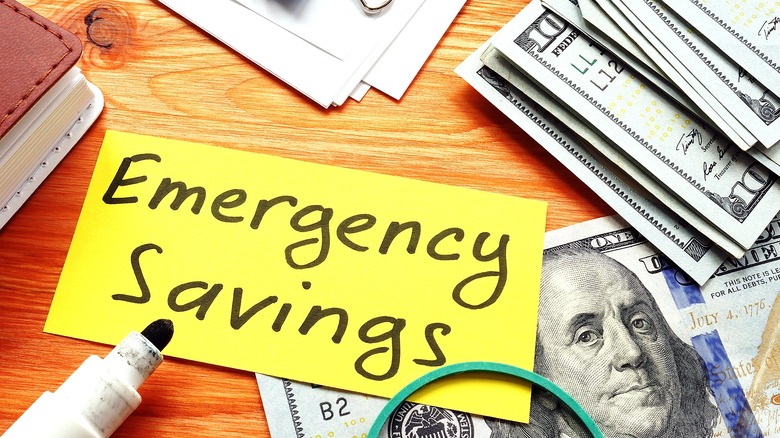Dave Ramsey Says You Should Have This Much Money In Your Savings Account
When it comes to saving money, financial expert Dave Ramsey believes that "every savings dollar has to have a job, a mission, an assignment." To Ramsey, it's less about a definitive number and more about what you're going to do with that money. Rather than having one nebulous savings account, he believes people should build their savings with a purpose, starting with an emergency fund. In a fully funded emergency fund, Ramsey believes in saving enough to cover three to six months' worth of (necessary) expenses.
Further, he says this "number is going to look different for everyone." However, to figure out your number, Ramsey says you should ask yourself how much money would you need if you were out of work and had no income coming in to cover your monthly bills, that is, housing, groceries, utilities, transportation, etc., and multiply that number by as many months as you think you'll need. Ramsey says you should save three to six months' worth, but leaves it up to the individual as far as how much you actually save, whether that's closer to three months or six, because, again, everyone's situation will be different.
Saving money with a purpose
Dave Ramsey's money-management plan known as "7 Baby Steps" begins with saving up $1,000 toward an emergency fund. However, he doesn't return to savings again until Step 3, as Step 2 is to pay off all debt, not including one's house. Once your debt is taken care of, then, he advises, you can start to build your emergency fund in earnest. And the three to six months' worth of savings won't need to cover debt either, since you have already taken care of that in the previous step.
In addition to an emergency fund, Ramsey is also a proponent of creating sinking funds, that is, savings put aside for a specific future expense. For example, saving a portion of your income each month for your holiday budget. Or, perhaps for a piece of furniture you know will need replacing within a year. Since you can anticipate this expense, you can save for it over time, versus taking money out of your emergency fund for a non-emergency or using your credit cards in a pinch.
In an August 2021 episode of his radio show, Ramsey said about savings without a purpose, "We were just taught to have a savings account ... and you know what a savings account is? It's a put-and-take account. You put money in there, you take it out. All this stuff is combined in this one general account that ... you always watch it, and it just never seems to do what it's supposed to do."
Don't confuse your savings goals
With regard to emergency funds and whether you need three months or six, Dave Ramsey says the better your situation, the less money you may save. On his radio program, he explained, "[T]he weird thing is, is the more money you get, the less need of an emergency fund you have ... because there's fewer emergencies." He said as people grow their money, they end up taking care of problems sooner rather than later, so there isn't a car repair or a burst pipe in their future. As things get taken care of, people feel better about their financial situation and may end up actually saving less for emergencies, feeling that three months or so is sufficient. For sinking funds, the same logic applies, as everyone's savings goals will be different and are changeable as well.
As for keeping emergency money safe from being used for a non-emergency, Ramsey advises not to put it together with your other savings. Again, you don't want to blur the lines between this particular savings and another. He says a money market account is a good option since the money is accessible still when you need it, but it's not right there, in your "put-and-take" savings account. "You separate out your savings and you say every savings dollar has to have a job, a mission, an assignment," said Ramsey, "... this one's job is transition, this one's job is Christmas, this one's job is car replacement, and this one job's is emergencies, and don't confuse them."


